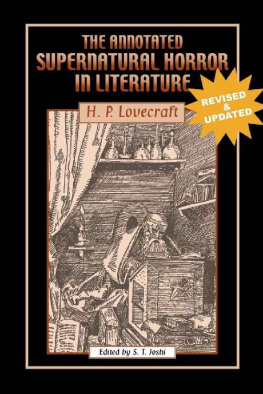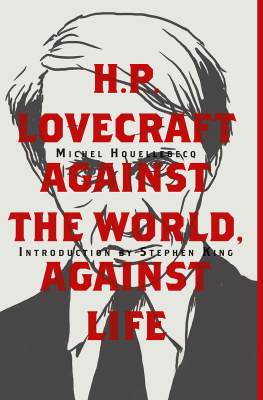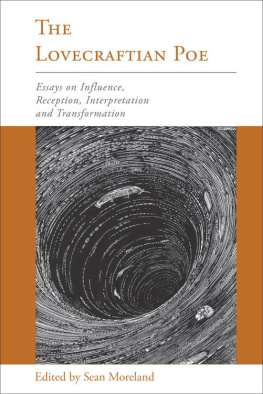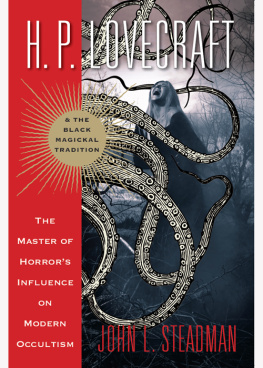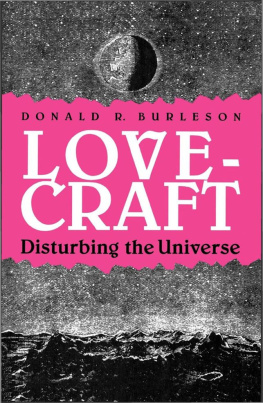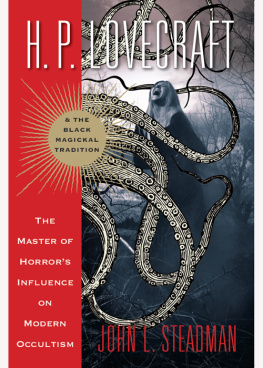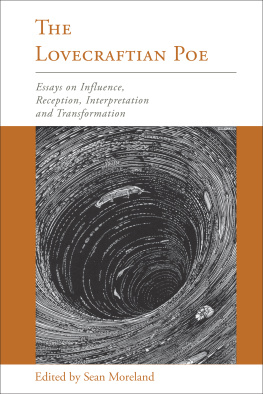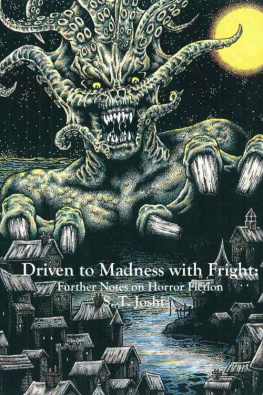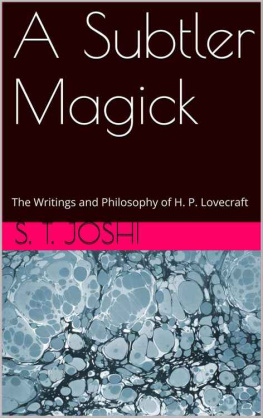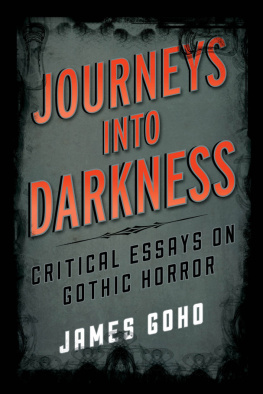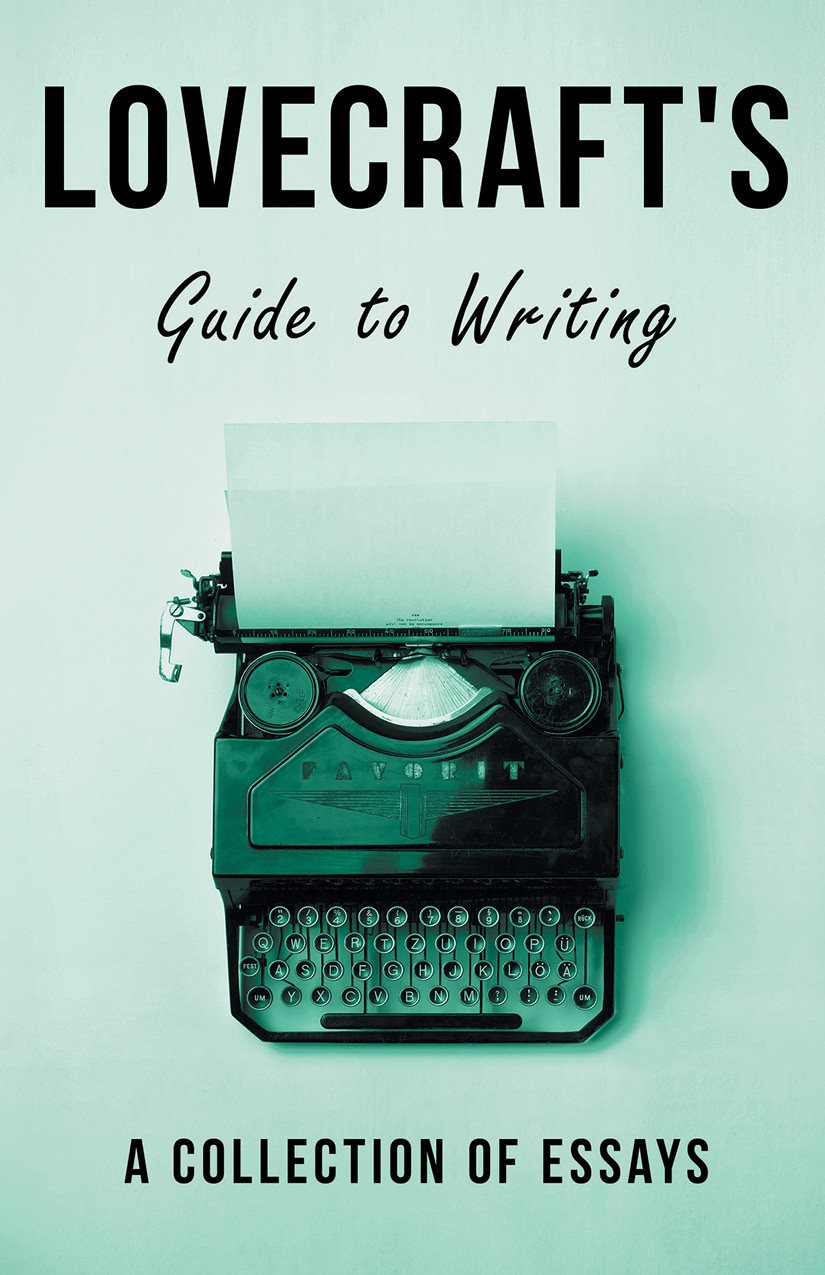Copyright 2020 Read & Co. Books
This edition is published by Read & Co. Books,
an imprint of Read & Co.
Read & Co. is part of Read Books Ltd.
For more information visit
www.readandcobooks.co.uk
H. P. Lovecraft
Howard Phillips Lovecraft was born in 1890 in Rhode Island, USA. Although a sickly boy, Lovecraft began writing at a very young age, quickly developing a deep and abiding interest in science. At just sixteen he was writing a monthly astronomy column for his local newspaper. However, in 1908, Lovecraft suffered a nervous breakdown and failed to get into university, sparking a period of five years in which he all b ut vanished.
In 1913, Lovecraft was invited to join the UAPA (United Amateur Press Association)a development which re-invigorated his writing. In 1917, he began to focus on fiction, producing such well-known early stories as Dagon and A Reminiscence of Dr. Samuel Johnson. In 1924, Lovecraft married and moved to New York, but he disliked life there intensely, and struggled to find work. A few years later, penniless and now divorced, he returned to Rhode Island. It was here, during the last decade of his life, that Lovecraft produced the vast majority of his best-known fiction, including The Dunwich Horror, The Shadow over Innsmouth, The Thing on the Doorstep and arguably his most famous story, The Call of Cthulhu. Having suffered from cancer of the small intestine for more than a year, Lovecraft died in Ma rch of 1937.
FACT AND FANCY
How dull the wretch, whose philosophic mind
Disdains the pleasures of fantastic kind;
Whose prosy thoughts the joys of life exclude,
And wreck the solace of the poets mood!
Young Zeno, practicd in the Stoics art,
Rejects the language of the glowing heart;
Dissolves sweet Nature to a mess of laws;
Condemns th effect whilst looking for the cause;
Freezes poor Ovid in an icd review,
And sneers because his fables are untrue!
In search of Truth the hopeful zealot goes,
But all the sadder tums, the more he knows!
Stay! vandal sophist, whose deep lore would blast
The graceful legends of the storyd past;
Whose tongue in censure flays th embellishd page,
And scolds the comforts of a dreary age:
Wouldst strip the foliage from the vital bough
Till all men grow as wisely dull as thou?
Happy the man whose fresh, untainted eye
Discerns a Pantheon in the spangled sky;
Finds Sylphs and Dryads in the waving trees,
And spies soft Notus in the southern breeze;
For whom the stream a cheering carol sings,
While reedy music by the fountain rings;
To whom the waves a Nereid tale confide
Till friendly presence fills the rising tide.
Happy is he, who void of learnings woes,
Th ethereal life of bodyd Nature knows:
I scorn the sage that tells me it but seems,
And flout his gravity in sunlit dreams!
H. P. Lovecraft
LOVECRAFT'S
GUIDE TO WRITING
A COLLECTION OF ESSAYS
SUPERNATURAL
HORROR IN LITERATURE
I
INTRODUCTION
The oldest and strongest emotion of mankind is fear, and the oldest and strongest kind of fear is fear of the unknown. These facts few psychologists will dispute, and their admitted truth must establish for all time the genuineness and dignity of the weirdly horrible tale as a literary form. Against it are discharged all the shafts of a materialistic sophistication which clings to frequently felt emotions and external events, and of a naively insipid idealism which deprecates the aesthetic motive and calls for a didactic literature to uplift the reader toward a suitable degree of smirking optimism. But in spite of all this opposition the weird tale has survived, developed, and attained remarkable heights of perfection; founded as it is on a profound and elementary principle whose appeal, if not always universal, must necessarily be poignant and permanent to minds of the requisite se nsitiveness.
The appeal of the spectrally macabre is generally narrow because it demands from the reader a certain degree of imagination and a capacity for detachment from every-day life. Relatively few are free enough from the spell of the daily routine to respond to rappings from outside, and tales of ordinary feelings and events, or of common sentimental distortions of such feelings and events, will always take first place in the taste of the majority; rightly, perhaps, since of course these ordinary matters make up the greater part of human experience. But the sensitive are always with us, and sometimes a curious streak of fancy invades an obscure corner of the very hardest head; so that no amount of rationalisation, reform, or Freudian analysis can quite annul the thrill of the chimney-corner whisper or the lonely wood. There is here involved a psychological pattern or tradition as real and as deeply grounded in mental experience as any other pattern or tradition of mankind; coeval with the religious feeling and closely related to many aspects of it, and too much a part of our inmost biological heritage to lose keen potency over a very important, though not numerically great, minority of our species.
Mans first instincts and emotions formed his response to the environment in which he found himself. Definite feelings based on pleasure and pain grew up around the phenomena whose causes and effects he understood, whilst around those which he did not understandand the universe teemed with them in the early dayswere naturally woven such personifications, marvellous interpretations, and sensations of awe and fear as would be hit upon by a race having few and simple ideas and limited experience. The unknown, being likewise the unpredictable, became for our primitive forefathers a terrible and omnipotent source of boons and calamities visited upon mankind for cryptic and wholly extra-terrestrial reasons, and thus clearly belonging to spheres of existence whereof we know nothing and wherein we have no part. The phenomenon of dreaming likewise helped to build up the notion of an unreal or spiritual world; and in general, all the conditions of savage dawn-life so strongly conduced toward a feeling of the supernatural, that we need not wonder at the thoroughness with which mans very hereditary essence has become saturated with religion and superstition. That saturation must, as a matter of plain scientific fact, be regarded as virtually permanent so far as the subconscious mind and inner instincts are concerned; for though the area of the unknown has been steadily contracting for thousands of years, an infinite reservoir of mystery still engulfs most of the outer cosmos, whilst a vast residuum of powerful inherited associations clings around all the objects and processes that were once mysterious, however well they may now be explained. And more than this, there is an actual physiological fixation of the old instincts in our nervous tissue, which would make them obscurely operative even were the conscious mind to be purged of all source s of wonder.


